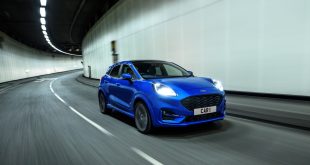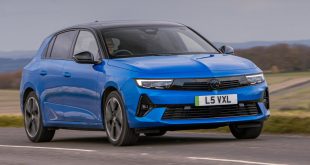This new second-generation pure electric Nissan Leaf comes seven years after the original. It offers more power, more tech, a new look and a slightly lower price. Most importantly, it now has a longer range from a bigger 40kWh battery. Let’s see how it performs in the real world…
What is it?
A VW Golf-sized hatchback, the original Leaf was a slightly strange looking car. A bland frontal appearance and an odd rear meant that it was no looker. However, a decent useable size and reasonable cost made it account for 47% of EV sales in the UK. A 24 kWh battery gave it a claimed range of more than 120 miles, but in real day-to-day use it was near 80-90 miles. Things improved a bit in 2015 with the fitting of a 30kWh battery.
The new model has been re-styled completely and, I have to say, looks a lot better. It has the appearance of a smart conventional hatchback, which, although giving it a degree of anonymity, will have greater appeal to the majority of buyers.
The single electric motor produces 148bhp, which is up from 107bhp. The associated increase in torque is instantly on tap from standstill. The battery is now 40kWh, which puts it on par with the VW e-Golf (36kWh) and Renault’s latest Zoe (41kWh). Claimed range from a full battery charge is 235 miles using the old NEDC test and 168 miles on the new WLTP test which is much closer to a real world figure. Full charging takes eight hours with a 7kWh home charger and only 40 minutes using a 50kWh fast charger.
There are four main trim levels; Visia, Acenta, N Connecta and Tekna. Standard features on all models include alloy wheels, air-conditioning and a 7.0-inch multifunction touchscreen incorporating Apple CarPlay and Android Auto.
Acenta adds electric folding mirrors, cruise control and fog lights. N Connecta, which is probably the best value model, has part-leather seats, parking sensors and a heated leather steering wheel. The top of the range Tekna features full LED lights, full-leather seats, a BOSE premium audio system and ProPilot.
ProPilot is a semi-autonomous driving aid that uses the adaptive cruise control, lane departure system and the e-Pedal regenerative braking system. Utilising regenerative braking to maximum effect, the e-Pedal allows driving just using the accelerator pedal. The brake pedal is only needed for more urgent or emergency stops.
Prices range from the £21,990 Visia up to £27,490 for the Tekna model. These prices are after the £4,500 government plug-in car grant.
First impressions
The new styling suits the Leaf, though some say it looks not unlike the new Honda’s Civic. The interior now feels much more up to date.
The infotainment screen is easy to use, although the resolution is below par. Menu options include a readout of the main vehicle energy usage sources which provides great fun on any journey when trying to maximize the range. The quality of plastics used on the doors and the fascia is a bit hard. Strangely, the lack of fore and aft adjustment to the steering wheel is a glaring omission.
Passengers in the rear get plenty of legroom but, because they are sitting above the battery pack, headroom is compromised. It is also a bit of a squeeze to get three adults across the back.
Because the battery does not take any space from the boot, it is a very useful 435 litres (the e-Golf has just 341 litres).
The only slightly strange anomaly is the significant intrusion of the BOSE sound system electronics in the Tekna model. A fixed plastic box the size of two A4 box files blocks the smooth boot floor.
How does it drive?
Driving an electric car is still a novelty. Rapid and silent take-off is the order of the day. Yes, the acceleration runs out of steam pretty quickly but in the stop/start sub-30mph world of urban driving the nippiness is addictive. In the Leaf this is magnified by the excellent e-Pedal system, which allows slowing to a stop without touching the brakes.
It doesn’t take long to adapt to driving completely with the use of the accelerator pedal alone. On the open road it actually encourages a smoother driving approach – no bad thing – as you learn to anticipate traffic ahead and time your deceleration to avoid using the brakes and therefore preserve energy.
Drive in a more spirited way, however, and you can watch the available range drop like a stone. At 70mph every eight miles driven drops the range by 10 miles and at 80 mph this happens every six miles. At least the Leaf is smooth and quiet on the motorway. Handling is pretty good but does not, obviously, encourage the sporty driver. The firm ride is generally good but can be fidgety over the rough stuff.
I tried the ProPilot which generally works well but relies on really clear white lines to function properly. It is not as impressive or a well sorted as, for instance, Volvo’s Pilot Assist system.
I also tried the optional £400 ProPilot Park which can park the car without any driver input into a parallel space or a normal parking bay. It worked well, but was rather slow and understandably cautious. I would expect several toots from impatient fellow motorists if I tried it in any normally busy supermarket car-park.
Verdict
The new Leaf is a great improvement over the previous model. Nissan have made the best use of advanced driver-aid technology and, more importantly, included a bigger 40kWh battery to increase the useable range. It becomes, for the moment, the most convincing and reasonably priced electric car available.
However, until the real world driving range of electric cars gets up to 200 – 250 miles, the buying public will not embrace them fully. It won’t be long though. VW are soon to release an e-Golf with a 48kWh battery pack and all the major manufacturers are developing electric-only models, which will benefit from ground-up designs.
 Automotive Blog Automotive Blog brings you the latest news, car reviews and information on the automotive industry.
Automotive Blog Automotive Blog brings you the latest news, car reviews and information on the automotive industry.











